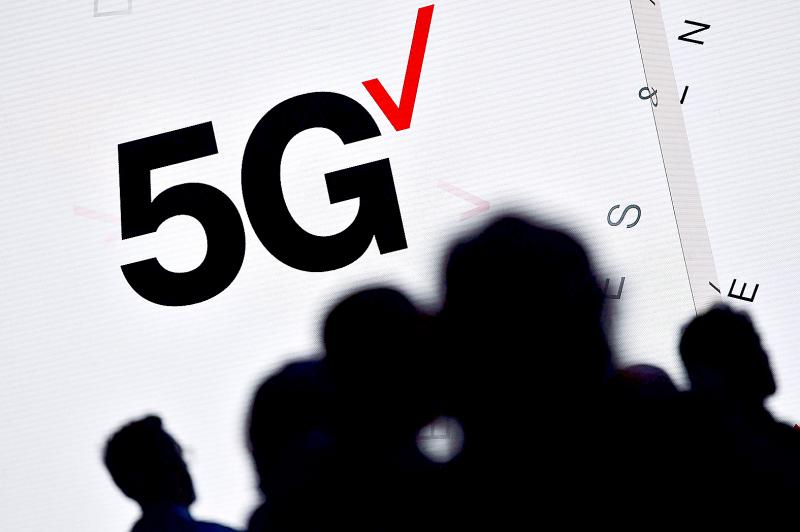Taiwan Mobile Co (台灣大哥大) has accumulated more than 800,000 5G subscribers in the first year of its 5G launch, representing a penetration rate of 14 percent, the company said yesterday.
Subscriptions to its 5G services increased faster than it had expected, the company said, pushing up its penetration rate higher than local peers’, even though it had acquired less of the 5G spectrum than major rivals.
Taiwan Mobile attributed the rapid growth to longer service contracts, its news release said, adding that it lengthened 5G contracts to 48 months, compared with 36 months for 4G service contracts, to ease the financial burden of people opting to sign up for a contract with a flagship smartphone.

Photo: Pau Barrena, AFP
More than half of Taiwan Mobile’s iPhone users selected the 48-month service contracts, and about 80 percent of its overall 5G users subscribed to contracts with high monthly tariffs, starting from NT$999, it said.
Company president Jamie Lin (林之晨) told investors last month that the company’s 5G penetration rate would grow by 1 to 1.5 percent each month this year, implying that the rate would rise to at least 20 percent by the end of this year.
In the first quarter of this year, 5G users helped lift the company’s overall average revenue per user by 26 percent, it said last month.
The company has built more than 6,000 high-speed 3.5 gigahertz 5G base stations covering more than 70 percent of the mobile traffic, it said.
Far EasTone Telecommunications Co (遠傳電信) yesterday said that its 5G subscribers are expected to number 800,000 by next month.
It has deployed more than 7,000 5G base stations since its 5G service launch a year ago.
Chunghwa Telecom Co (中華電信), which also launched 5G services last year, had said that its 5G subscribers would number more than 1 million by the end of this month, thanks to users upgrading faster than expected from 4G services.

RUN IT BACK: A succesful first project working with hyperscalers to design chips encouraged MediaTek to start a second project, aiming to hit stride in 2028 MediaTek Inc (聯發科), the world’s biggest smartphone chip supplier, yesterday said it is engaging a second hyperscaler to help design artificial intelligence (AI) accelerators used in data centers following a similar project expected to generate revenue streams soon. The first AI accelerator project is to bring in US$1 billion revenue next year and several billion US dollars more in 2027, MediaTek chief executive officer Rick Tsai (蔡力行) told a virtual investor conference yesterday. The second AI accelerator project is expected to contribute to revenue beginning in 2028, Tsai said. MediaTek yesterday raised its revenue forecast for the global AI accelerator used

TEMPORARY TRUCE: China has made concessions to ease rare earth trade controls, among others, while Washington holds fire on a 100% tariff on all Chinese goods China is effectively suspending implementation of additional export controls on rare earth metals and terminating investigations targeting US companies in the semiconductor supply chain, the White House announced. The White House on Saturday issued a fact sheet outlining some details of the trade pact agreed to earlier in the week by US President Donald Trump and Chinese President Xi Jinping (習近平) that aimed to ease tensions between the world’s two largest economies. Under the deal, China is to issue general licenses valid for exports of rare earths, gallium, germanium, antimony and graphite “for the benefit of US end users and their suppliers

Dutch chipmaker Nexperia BV’s China unit yesterday said that it had established sufficient inventories of finished goods and works-in-progress, and that its supply chain remained secure and stable after its parent halted wafer supplies. The Dutch company suspended supplies of wafers to its Chinese assembly plant a week ago, calling it “a direct consequence of the local management’s recent failure to comply with the agreed contractual payment terms,” Reuters reported on Friday last week. Its China unit called Nexperia’s suspension “unilateral” and “extremely irresponsible,” adding that the Dutch parent’s claim about contractual payment was “misleading and highly deceptive,” according to a statement

Artificial intelligence (AI) giant Nvidia Corp’s most advanced chips would be reserved for US companies and kept out of China and other countries, US President Donald Trump said. During an interview that aired on Sunday on CBS’ 60 Minutes program and in comments to reporters aboard Air Force One, Trump said only US customers should have access to the top-end Blackwell chips offered by Nvidia, the world’s most valuable company by market capitalization. “The most advanced, we will not let anybody have them other than the United States,” he told CBS, echoing remarks made earlier to reporters as he returned to Washington